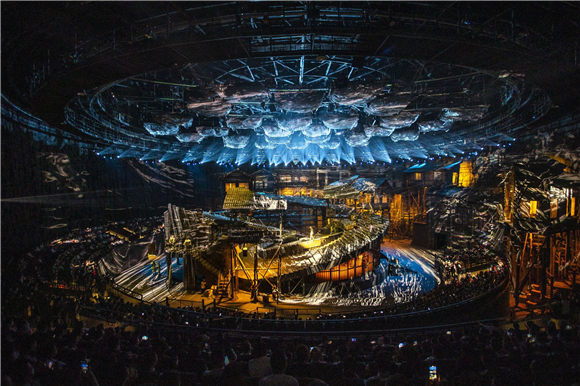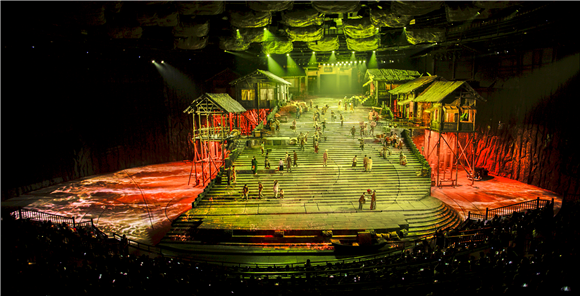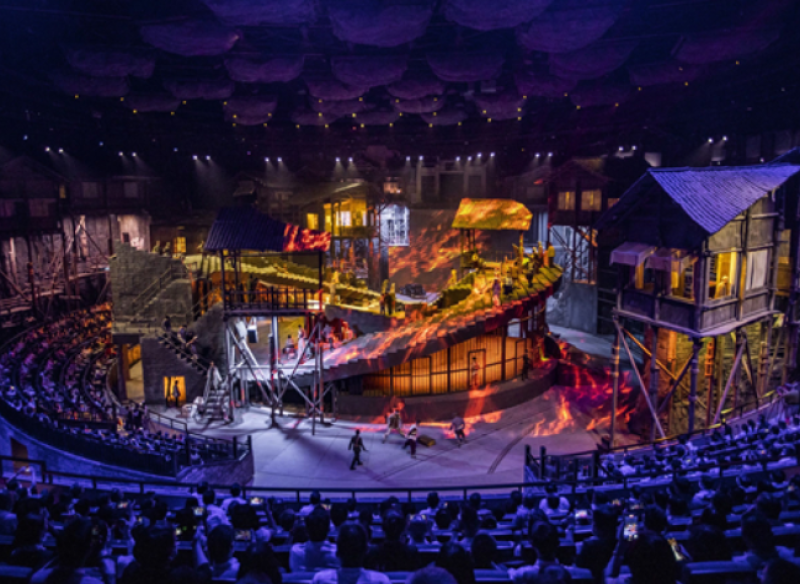'Chongqing 1949': A Time-Traveling Immersive Journey into Heroic Tales
By: By Chang Chen

'Chongqing 1949': A Time-Traveling Immersive Journey into Heroic Tales
Chongqing, a magnificent mountain city, is not only rich in cultural heritage but also carries a valiant historical narrative of heroes. To truly understand Chongqing, one must delve into its memory and spirit. If you're visiting Chongqing, don't miss the opportunity to witness the stage drama "Chongqing 1949." Spend 75 minutes immersing yourself in the atmosphere of what is known as the "Heroic City."

"Chongqing 1949" stage drama panoramic view. (Photo/Chongqing 1949 Grand Theatre)
"Chongqing 1949" portrays deeply moving stories from the eve of Chongqing's liberation in 1949, depicting patriots preparing for the dawn of a new era. The theater's design team has profoundly explored themes of revolutionary history and regional culture, envisioning a large auditorium space where the audience and performance become one. The main structure is a hall 80 meters long, 72 meters wide, and 26 meters tall, incorporating spaces and equipment such as rotating stands and mobile stages, closely tied to the storyline's development.

The rotating stage of "Chongqing 1949." (Photo/Chongqing 1949 Grand Theatre)
The Chongqing 1949 Grand Theatre stands as the first theater in China named after a drama located in the historic Ciqikou area of Chongqing's Shapingba District. It is a marvel of modern architecture that integrates seamlessly with its traditional surroundings. The theater boasts the country's only 360-degree rotating stage and auditorium, innovatively intertwining performance and viewing spaces. This design allows the audience to fully immerse themselves in the performance, becoming one with the show in what is now the world's largest indoor dynamic, immersive theater space designed to meet the unique requirements of the show.

The "Chongqing 1949" stage drama realistically restores the original appearance of Ciqikou. (Photo/Chongqing 1949 Grand Theatre)
Since its debut in 2021, "Chongqing 1949" has received widespread acclaim from audiences and various sectors, earning numerous honors for its engaging and successful performances.
The Chongqing 1949 Grand Theatre has 1,502 seats divided into four viewing areas: A, B, C, and D. Areas A and B are rotating sections offering a more immersive experience with richer details, while C and D provide fixed seats. Seats in areas C and D are recommended for children under 1.2 meters, seniors 65 years and older, pregnant women, and those with conditions like vertigo, heart disease, or spinal issues.
The modern facade of the Chongqing 1949 Grand Theatre and the revolutionary essence of the "Chongqing 1949" stage drama encapsulate Chongqing's "revolution-themed romance" in the new era. It's an experience you shouldn't miss while in Chongqing!
This article is updated on April 1, 2024.
The administrator of this group reserves the right, along with the site moderators, to moderate all and any postings to this group, including the right to enforce the ToS, the CoC, and also including anything that the administrator deems within his sole discretion to be offensive or off topic, with the power to delete in exercising those rights.
It would be best, therefore, to be civil in posting on this group.
By now it should be well known that I am unable to open certain videos and pictures. If I cannot, I will ask that they be described and explained. If the poster refuses to comply, their comment will be deleted. Instagrams are banned.




I can't believe this. I've been living in Chonqing for years now and I never knew anything about what appears to be one of the most magnificent unique theatres in the whole world. Now i have to make plans to take in that show. I've been in the Ciqikou area a few times and never knew the theatre was there, and we live in the Shapingba area, except where we live is in the University Town district, aptly named since there are three beautiful university campuses within walking distance of where we live.
Chongqing has a history that ties in with the United States as well, it being the home base for the Flying Tigers. I've been to the Flying Tigers Museum that was once the home of General Stilwell where I met and spoke with one of the original Chinese Flying Tiger pilots who flew cargo planes "over the hump" (the mountains) to Burma. Although the movie plot was meant to take place in Chongqing, it was filmed entirely in the USA. In the movie 30 Seconds Over Tokyo, the pilots were told to head for Chongqing after they dropped their bombs on Tokyo.
I've always been interested in the Pacific theatre of WWII. I am glad that there is a Flying Tigers Museum in China. I still recall the picture of you with one of those pilots. That was a precarious time for the allies.
In the movie 30 Seconds Over Tokyo, the pilots were told to head for Chongqing after they dropped their bombs on Tokyo.
The Doolittle raid was launched from the carrier Hornet, which was about 600 miles from Tokyo, which meant that it would be impossible for any of the planes to return to American held territory. They would have to hit Tokyo and continue on to somewhere (as it turned out Chongqing, China) where they hoped to be able to find allied Chinese forces to take them in. Although most of the pilots survived, (77 of 85 were rescued by the Chinese), the unlucky Hornet was sunk not long after that.
I just remembered that back at the time of The Flying Tigers Chongqing was called Chunking. But name changes like that were not that unusual, for example Beijing used to be called Peking.
The descendant families of the American Flying Tiger pilots and staff often have wonderful friendly get-togethers back in Chongqing with many Chinese people who treat them with the warmest welcome. In the past I've posted at least one article about those occasions.
Wasn't it the Capitol of Nationalist China?
I think it was, until they were chased by the Red Army to Taiwan. However, the people of Chonqqing are still eternally grateful for the then presence of the Americans, and that will never fade away, as it has become a tradition.
That is a very interesting part of the history.
However, the people of Chonqqing are still eternally grateful for the then presence of the Americans, and that will never fade away, as it has become a tradition.
That I am glad to hear though I'm not really surprised.